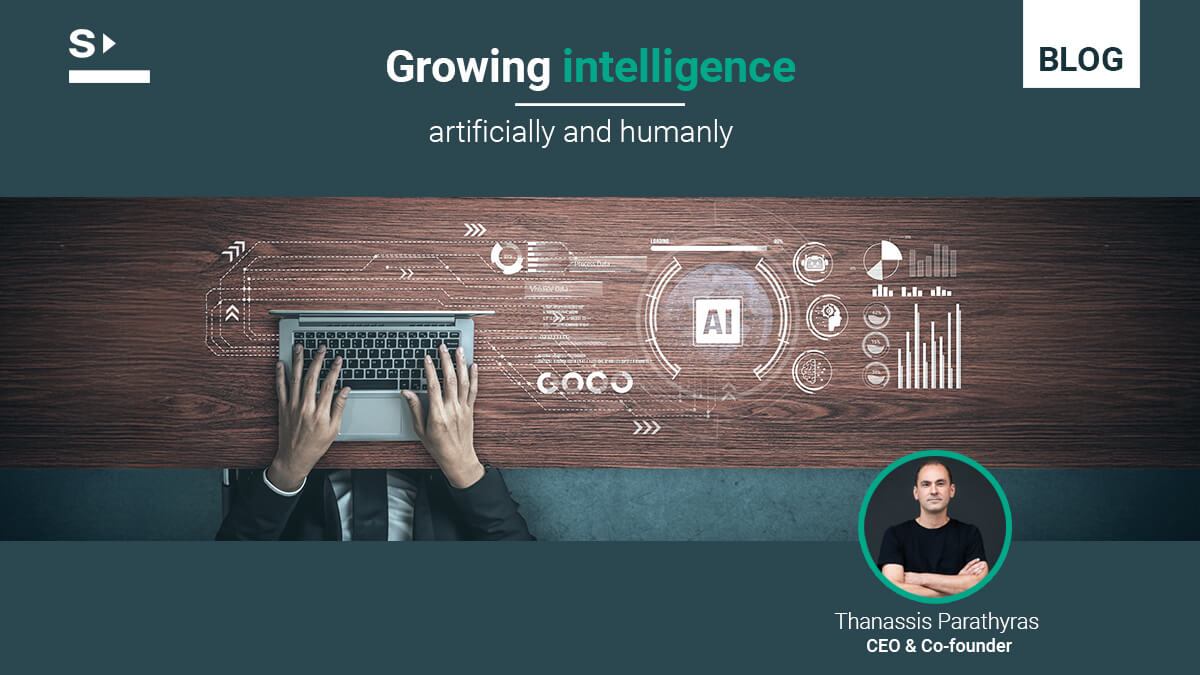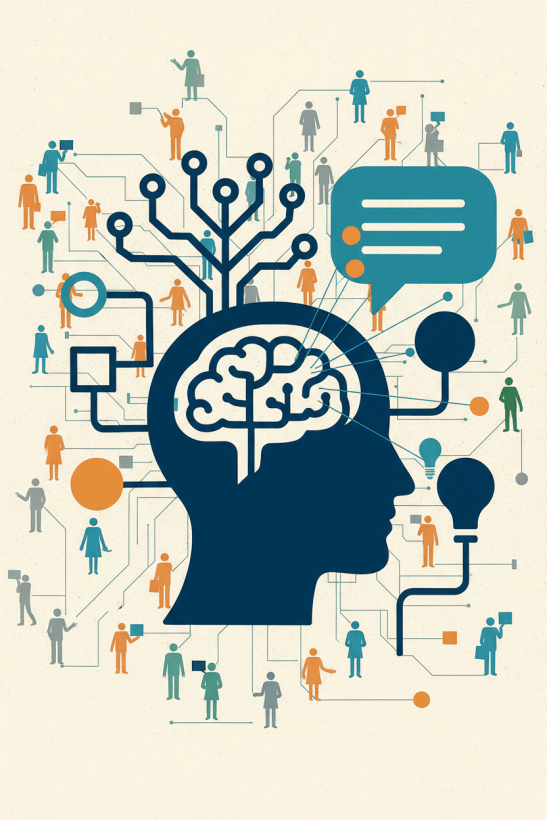Growing intelligence artificially and humanly

Learning to think wiser in a world where machines reflect our minds.
AI touches every part of our lives, transforming how we think, learn, and understand. This post explores how AI shapes human thinking, the illusions it creates, and the challenge of growing true intelligence alongside our machines.

The quiet arrival of AI
Artificial intelligence has quietly entered almost every part of modern life. From the apps we use on our phones to the tools driving business decisions, AI is no longer an abstract idea or a future promise. It is a daily companion. Almost everyone interacts with it, often without realizing it. It writes, translates, recommends, summarizes, and explains. It listens, responds, and adapts. AI has become part of the background of life, always there, always ready to help.
Like fire or electricity in earlier ages, AI began as a spark of curiosity among researchers but quickly became a foundation for how societies function. Its adoption was faster than any technology before, not because of its complexity, but because of its simplicity. People do not need to learn how to use AI. They just talk to it.
A new relationship with knowledge
AI has transformed the way we access and use knowledge. We no longer search; we ask. Instead of scanning pages of results, we receive direct, complete answers. The interaction feels personal, intelligent, and effortless. The distance between a question and an understanding has become shorter than ever.
This change marks a profound shift in how humans process knowledge. For centuries, learning required exploration, comparison, and thinking through information. We gathered fragments from different sources, stitched them together, and built understanding through effort. Now, with a single prompt, we receive a condensed reflection of the world’s collective knowledge.
In many ways, this democratizes access to understanding. A teenager in a small village can ask the same complex questions as a university researcher and get a clear response. The barrier of access has fallen. Yet, as with all shortcuts, some richness may be lost in the process.
The flattering mirror
AI systems are built to be helpful and agreeable. They make our ideas sound sharper, our thoughts more coherent, and our questions more intelligent. The experience is enjoyable and even addictive. The machine listens without judgment, responds with patience, and always finds value in what we say.
This dynamic is powerful but also deceptive. Like Narcissus in Greek mythology, we risk falling in love with our own reflection. The AI becomes a mirror of our mind, echoing our ideas back with polished language and logic. We start to believe that every question we ask is important, every argument strong, and every conclusion correct. Yet, what we often see is not truth but a reflection of our own assumptions shaped by patterns in the data AI learned from.
The illusion of understanding
AI does not understand in the human sense. It predicts words based on patterns, not meaning. But its fluency and confidence create the illusion of wisdom. For someone without experience, a convincing answer often feels like a correct one. This can be risky when people mistake confidence for truth.
This illusion reflects a timeless pattern. In Greek myths, Prometheus gave humans fire, a gift of knowledge and power, before they were fully ready to control it. Fire brought progress but also destruction. AI is similar: it gives access to knowledge, yet it requires maturity to use wisely.
We must remember that the value of AI lies not in the answers it gives but in how we use them. Blind acceptance turns intelligence into dependence. True understanding requires questioning, checking, and context. Without these, we risk building castles of thought on weak foundations.
The experience gap
Experience is the compass that helps us navigate AI. Those who have faced real-world challenges, managing teams, building systems, raising children, negotiating with others, can sense when an AI answer feels wrong. They bring intuition and perspective that machines cannot replicate.
Many others lack that grounding. They follow the machine’s advice as if it were the only truth. When AI speaks, it speaks with authority. In a world that values speed over reflection, few stop to question it. This creates a new kind of hierarchy, where the ability to judge AI becomes a form of wisdom.
The challenge ahead is not just to use AI effectively but to grow human intelligence; learning to filter, question, and interpret. Without it, we risk letting machines guide our thinking.
The human ego and the comfort of certainty
Humans are drawn to approval. We like to feel right, understood, and validated. AI gives us that endlessly. It never challenges us; it only completes our thoughts. This comfort is tempting but rarely leads to growth.
The myth of Icarus captures this tension perfectly. Empowered by his father’s invention, he flew higher and higher, ignoring warnings, until the sun melted his wings. The story is not about disobedience; it is about balance. Technology gives us wings, but wisdom tells us how high to fly.
The next step for human learning
Every major leap in human history, language, writing, printing, the internet, has changed how we think. AI adds another dimension: thinking with something that thinks back. This shift challenges us to redefine learning. It is no longer about memorizing facts or following steps. It is about understanding relationships, interpreting meaning, and developing judgment.
Education will need to change. Teaching people how to use AI is less important than teaching them how to question it. The future belongs to those who can blend human intuition with machine intelligence, people who can work with AI as a partner, not rely on it blindly.
A collective intelligence
As societies, we face a choice. We can use AI to increase creativity, deepen collaboration, and spread knowledge widely. Or we can use it to simplify thinking, reduce truth, and centralize control.
The best outcome is not a world where humans think less, but one where we think differently, more reflectively, more critically, and more empathetically. In mythology, Athena, the goddess of wisdom, was born from Zeus’s mind, a symbol that intelligence combined with self-awareness leads to wisdom. Our challenge is to make sure the intelligence we are creating serves the same purpose.
Growing intelligence
AI is not the end of human evolution; it is part of it. The real question is not whether machines will surpass us, but whether we will grow alongside them. The age of AI can also be the age of renewed human intelligence if we learn to balance progress with perspective, speed with depth, and brilliance with humility.
If AI helps us think faster, we must learn to think wiser. That may be the truest form of intelligence, both artificial and human.
